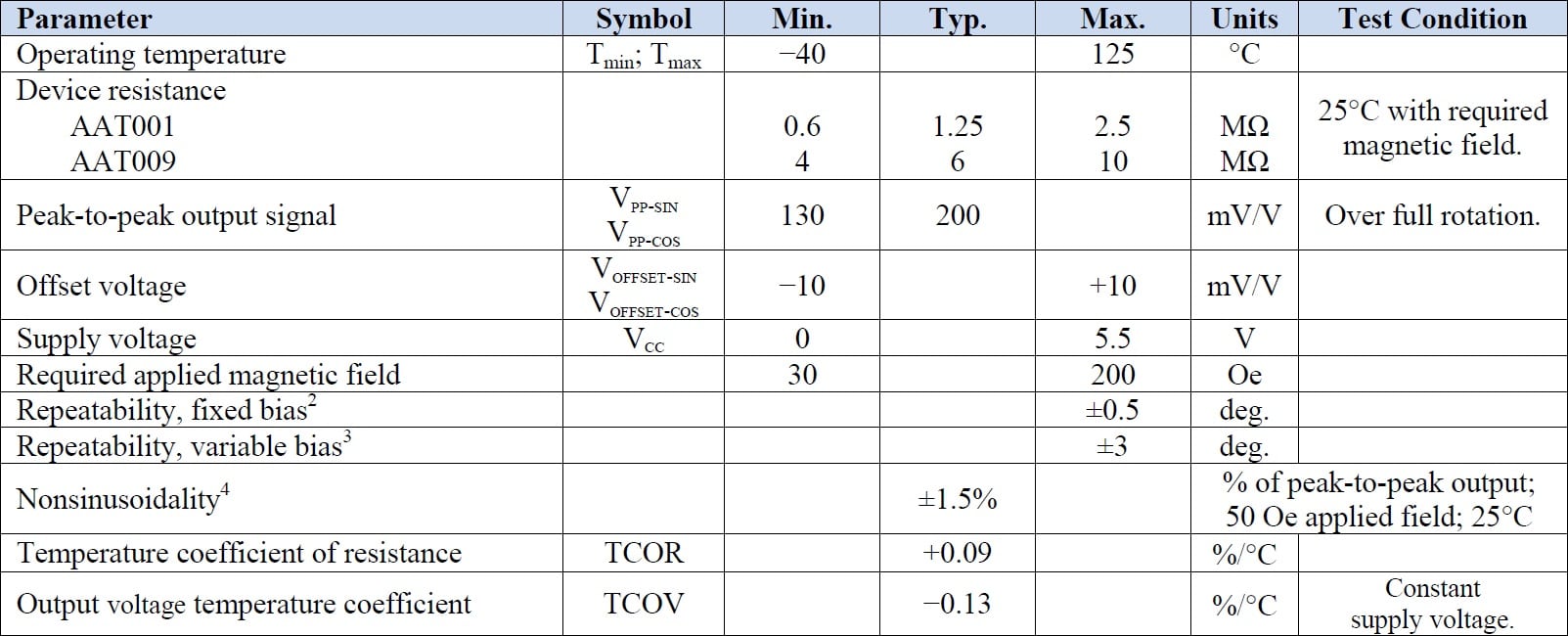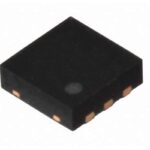The NVE AAT009-10E angle sensors use unique tunnelling magnetoresistance (TMR) elements for large signals and low power consumption. The sensor provides sine and cosine signals defining the angle of rotation, the outputs are proportional to the supply voltage and peak-to-peak output voltages are much larger than conventional sensor technologies. The AAT009-10E sensors from NVE consist of two half-bridges with a typical bridge resistance of 6MΩ for ultra low power applications.
The AAT009-10E sensor contains four sensing resistors at 90° intervals and are connected as two half-bridges providing the sine and cosine voltage outputs. For each half bridge the resistance of one element increases and the other decreases as the field rotates, thus the bridge resistance, device resistance and output impedances remain constant with rotation.
Typical applications for the ATT series include:
The below table gives the full specifications of the NVE AAT angle sensor series including the AAT009-10E:

2. “Fixed Bias” means a fixed airgap between the bias magnet and sensor so the magnetic field at the sensor is constant.
3. “Variable Bias” means the magnetic field strength at the sensor can vary across the specification range.
4. Maximum deviation of either output from an ideal sine wave.
| Weight | 0.02500 kg |
|---|---|
| Dimensions | 0.80 x 2.50 x 2.50mm |
| Magnetic Field Range | 30 Oe, 200 Oe |
| Output | 0.2V/V |
| Repeatability | ±0.5° |
| Series / Model | |
| Temperature Range (°C) | -40 to +125°C |
| Typical Resistance | 6MΩ |
| Product name | SKU | Datasheet | ||
|---|---|---|---|---|

| NVE AAT001-10E | NVE AAT001-10E | View Product | |

| NVE AAT003-10E | NVE AAT003-10E | View Product | |

| NVE AAT006-10E | NVE AAT006-10E | View Product | |

| NVE AAT009-10E | NVE AAT009-10E | View Product | |

| NVE AAT101-10E | NVE AAT101-10E | View Product |
We are pleased to provide you with a range of additional content including videos, product datasheets, case studies, white papers and application notes for your reference. Please see below for the latest content available:
| VIDEOS | |
|---|---|
| Angle Sensor on a Lego Car
NVE put an angle sensor on a remote-control Lego car to demonstrate the sensor's awesome precision and airgap tolerance. The AAT series sensor has a precision better than one degree, which is about 1/64" for the 2" diameter Lego wheels. AAT Sensors are "awesome" for motion control because they allow wide magnet airgaps for simple positioning, large output signals and low output impedance allow direct interface to microcontrollers like Arduinos. They are absolute rather than relative sensors, and they're small. |
|
| Angle Sensor Live Demonstration
NVE's Jay Brown demonstrates that AAT-Series TMR sensors are extremely small, sensitive, and low power. |
|
| Arduino Angle Sensor Demo (short version)
The AAT003 non-contact angle sensor in a stepper motor servo system. This demonstration shows the unique capabilities of AAT-Series tunneling magnetoresistance sensors. NVE use a simple Arduino controller with a modified clock as a position indicator. |
|
| VIDEOS | |
|---|---|
| Angle Sensor on a Lego Car
NVE put an angle sensor on a remote-control Lego car to demonstrate the sensor's awesome precision and airgap tolerance. The AAT series sensor has a precision better than one degree, which is about 1/64" for the 2" diameter Lego wheels. AAT Sensors are "awesome" for motion control because they allow wide magnet airgaps for simple positioning, large output signals and low output impedance allow direct interface to microcontrollers like Arduinos. They are absolute rather than relative sensors, and they're small. |
|
| Angle Sensor Live Demonstration
NVE's Jay Brown demonstrates that AAT-Series TMR sensors are extremely small, sensitive, and low power. |
|
| Arduino Angle Sensor Demo (short version)
The AAT003 non-contact angle sensor in a stepper motor servo system. This demonstration shows the unique capabilities of AAT-Series tunneling magnetoresistance sensors. NVE use a simple Arduino controller with a modified clock as a position indicator. |
|